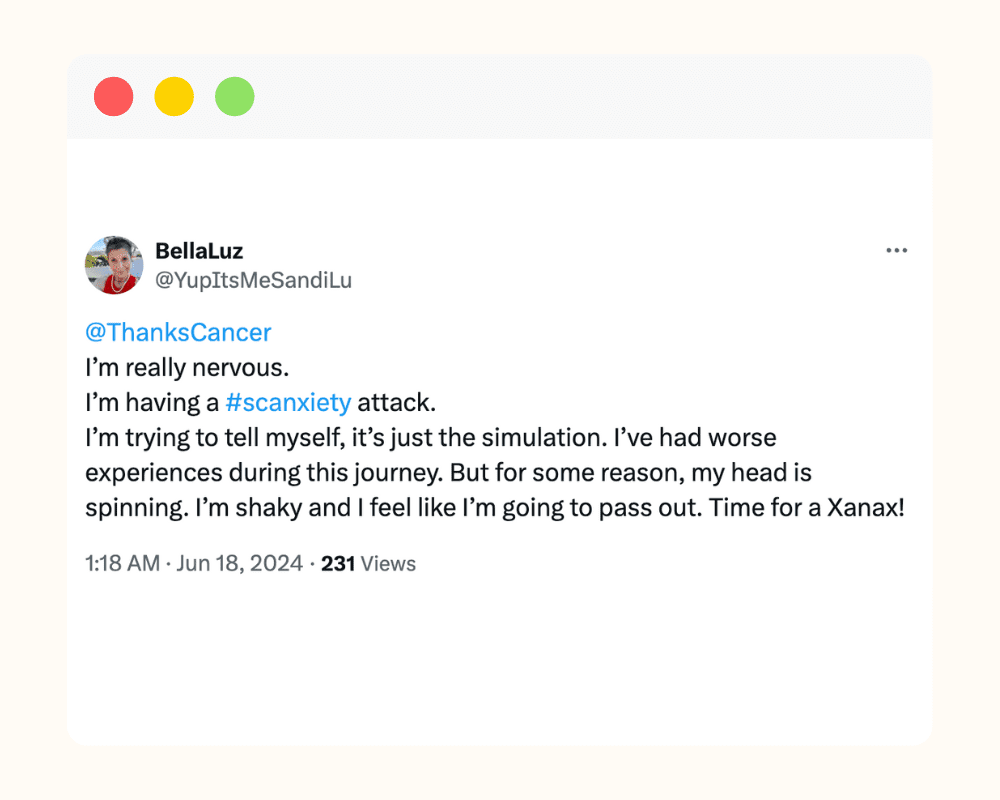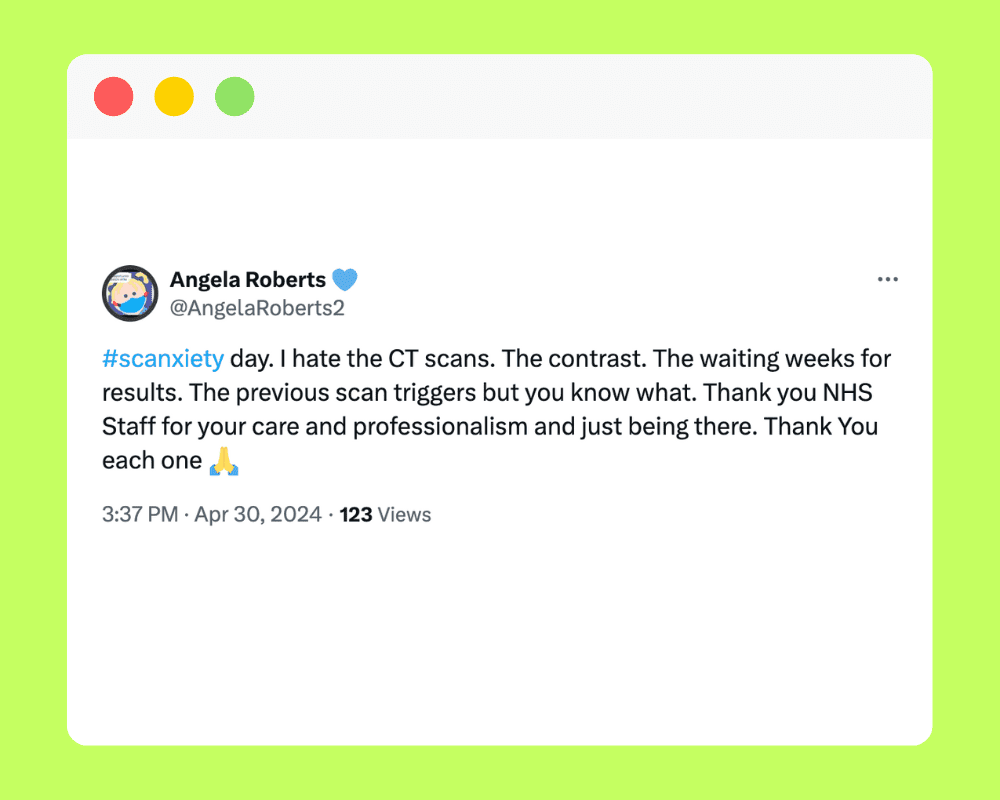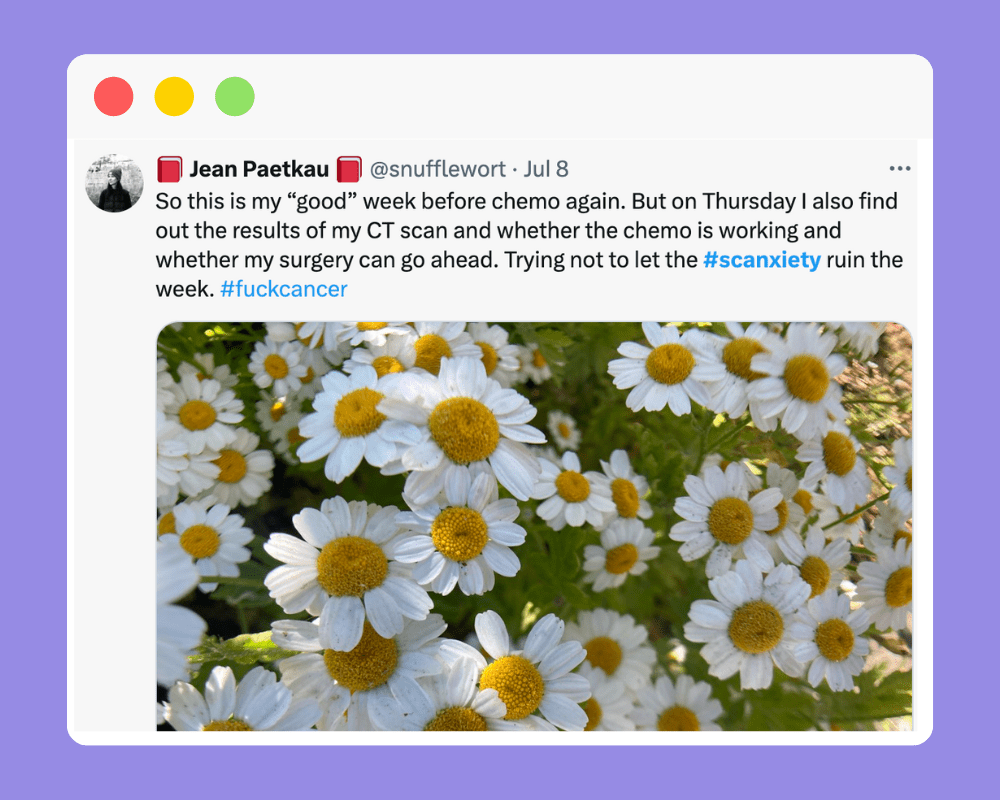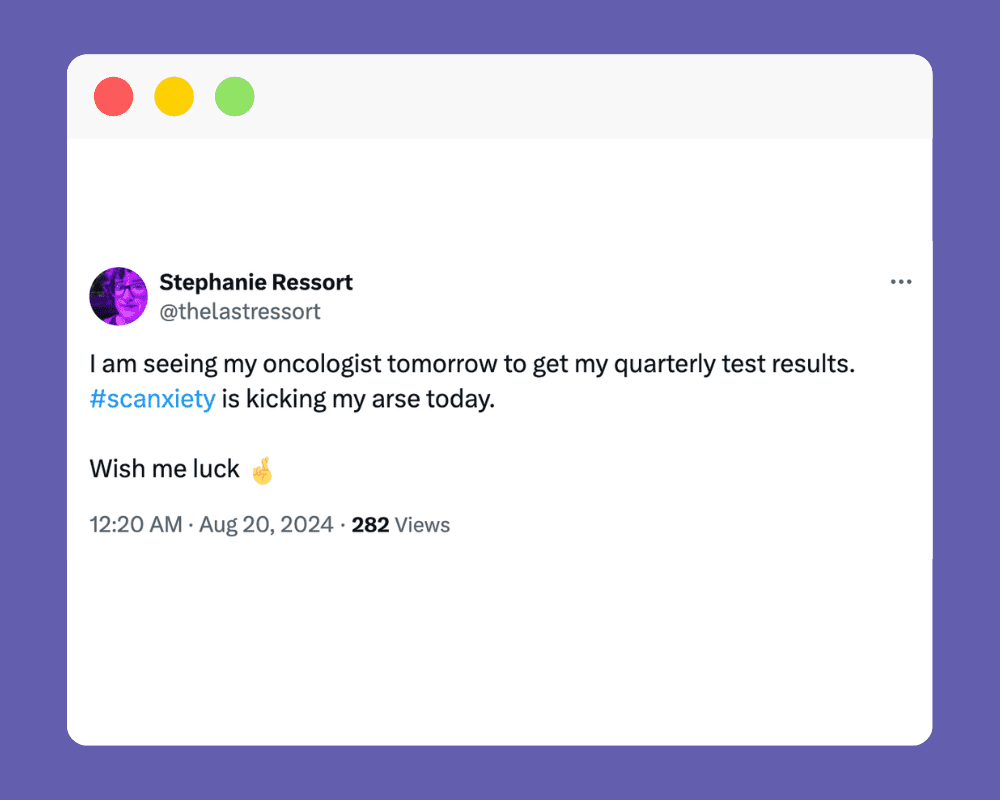- Blog
- Living with Ovarian Cancer
- Article
8 Powerful Ways to Deal with Scanxiety: Dealing with Scan-Related Stress in Ovarian Cancer
August 22, 2024

Scanxiety. It’s a term that’s been buzzing around cancer communities for years, but what exactly is it? And why does it matter, especially for those of us dealing with ovarian cancer?
If you’ve ever felt your heart race at the thought of an upcoming CT scan or ultrasound, you’re not alone. Scanxiety is a very real phenomenon that affects countless individuals living with or beyond ovarian cancer.
Today, we’re diving deep into this topic to shed light on what scanxiety is, how it impacts people with ovarian cancer, and most importantly, how to deal with it.

What is Scanxiety?
Let’s start with the basics. Scanxiety is a mash-up of “scan” and “anxiety,” and it’s exactly what it sounds like: the anxiety or distress that occurs before, during, or after medical imaging scans.
For those of us with ovarian cancer, it might be that knot in your stomach as you lie in the cold embrace of a CT machine. It’s the restless nights leading up to your transvaginal ultrasound appointment. It’s the days (or weeks) of nail-biting as you wait for results that could determine your next steps in treatment.
And it’s not just scans. This feeling can sneak up on us during routine blood work or even a regular visit to our gynecologic oncologist. In the world of ovarian cancer, anxiety often lurks around every corner.

But scanxiety isn’t just about feeling a little nervous. For many women diagnosed with ovarian cancer as well as their loved ones, it’s an overwhelming wave of fear and uncertainty that can disrupt daily life and chip away at mental well-being. It’s a reminder of the fragility of health and the weight of the unknown.
Scanxiety doesn’t discriminate. It can affect anyone undergoing medical scans, but it’s particularly common and intense for those of us in the ovarian cancer community. Why? Because for us, scans aren’t just routine procedures. They’re potential turning points. Each scan carries the possibility of life-altering news. Has the cancer spread? Is the treatment working? Is it back?
These aren’t just medical questions; they’re existential ones that can shake us to our core.
When Does Scanxiety Strike?
For those of us dealing with ovarian cancer, scanxiety is a sneaky beast. It doesn’t wait for the day of your scan to rear its ugly head. For many, it starts creeping in as soon as the appointment is scheduled. You might find yourself obsessing over every little twinge or bloating, convinced it’s a sign that your cancer has returned or progressed.

The day of the scan itself can be a roller coaster of emotions. There’s the anxiety of the procedure itself. Will the contrast dye make me feel weird? How long will I have to hold my breath for the CT? What if they find something unexpected? Then there’s the heart-pounding moment when the technician finishes and says those dreaded words: “The doctor will review the results.”
But perhaps the most agonizing part is the waiting game after the scan. Whether it’s hours, days, or weeks until you get your results, that time can feel like an eternity. Every ring of the phone could be THE call from your gynecologic oncologist. Every twinge in your abdomen becomes suspect. It’s exhausting, to say the least.
Even after you get your results (hoping they’re good), the relief might be short-lived. Because you know another scan is always on the horizon. With ovarian cancer’s tendency to recur, this cycle of scanxiety can feel never-ending.
It’s not just about the scans either. Visiting your doctor’s office can be tough too. Many patients report feeling anxious or experiencing PTSD-like symptoms in medical settings. These places often hold memories of receiving bad news or undergoing difficult treatments. So even routine check-ups can trigger intense emotions.

How to Deal with Scanxiety
How do we cope with scanxiety while navigating ovarian cancer? While there’s no one-size-fits-all solution, there are strategies that many in our community find helpful. Here are 8 powerful ways to deal with scanxiety:
Arm Yourself with Knowledge
Understanding what to expect can help demystify the process and ease some anxiety. Don’t be afraid to ask your gynecologic oncologist or care team questions about the procedure, the timeline for results, and what the scan is looking for specifically. Knowledge really is power when it comes to managing scanxiety in ovarian cancer.
Not sure what to ask? Here’s a list of essential ovarian cancer questions to ask as you navigate your journey.
Find Your Zen Zone
Relaxation techniques can be powerful tools against anxiety. This could be meditation, deep breathing exercises, or even just listening to your favorite calming playlist.
Find what works for you and make it part of your pre-scan routine. Maybe it’s gentle yoga, maybe it’s journaling about your cancer journey: whatever helps you feel centered and calm.
Distract, Distract, Distract
In the lead-up to your scan and during the waiting period for results, keep yourself busy. Dive into a new hobby, binge-watch that show everyone’s been talking about, or plan a fun outing with friends.
Anything to keep your mind off the “what ifs” about your ovarian cancer. The key is to engage in activities that capture your attention and give your worrying mind a break.

Rally Your Support Squad
Don’t go through this alone. Share your feelings with loved ones or connect with others in the ovarian cancer community who understand what you’re going through.
Support groups (online or in-person) can be incredibly valuable. Sometimes just knowing you’re not alone in your feelings can make a world of difference.
Reframe Your Perspective
Try to view scans as a positive tool in your ovarian cancer journey. They’re providing valuable information to help you and your medical team make the best decisions for your care.
It’s not always easy, but shifting your mindset from “dreading the scan” to “grateful for the information” can help ease some anxiety.

Have a Scan Day Strategy
Make a game plan for the day of your scan. Bring comfy clothes, your favorite book or music, and maybe a trusted friend or family member for moral support. If there are any special instructions for your particular scan (like fasting or drinking water), make sure you’re prepared for those too. Having a plan can help you feel more in control of the situation.
Consider Professional Support
If scanxiety is significantly impacting your quality of life, don’t hesitate to seek help from a mental health professional who has experience with cancer patients.
They can provide coping strategies tailored to your specific situation with ovarian cancer. There’s no shame in getting extra support. It’s a sign of strength, not weakness.
Practice Self-Compassion
Remember, it’s okay to feel anxious. Don’t beat yourself up for having these feelings. Acknowledge them, but try not to let them consume you. Treat yourself with the same kindness you’d show a good friend going through ovarian cancer.
You’re Not Alone in Experiencing Scanxiety
Managing scanxiety is a journey, not a destination. What works for you might change over time, and that’s okay. The important thing is to keep trying different strategies until you find what helps you feel more at ease.
Scanxiety is a real and valid experience for those of us dealing with ovarian cancer. But it doesn’t have to control your life. At Not These Ovaries, we’re not just funding research to improve treatments and outcomes; we’re building a community that understands what you’re going through.
You’re not alone in this. Millions of people, including many in the ovarian cancer community, experience scanxiety. It’s a shared struggle that unites us. Our ovarian cancer research fund is designed to advance clinical trials and research that could lead to better early detection methods and more effective treatments, hoping to make scanxiety a thing of the past.
So next time you’re in that scanning machine, take a deep breath. Remember, this scan is just one moment in your larger health journey. No matter the results, you have the strength to face it… and a whole community behind you, cheering you on.
(Image credit: snufflewort, dbartle3, sophieRblake, AngelaRoberts2, YupItsMeSandiLu, thelastressort)


